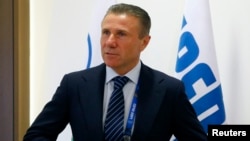SOCHI, RUSSIA —
Ukraine's political turmoil undermined efforts on Sunday by former Olympic champion Sergei Bubka to promote a bid by its western city of Lviv to host the 2022 Winter Games.
Bubka, now president of Ukraine's Olympic Committee, said he was confident that his country could swiftly resolve the divisions that are tearing it apart.
"It's eight years before the 2022 Games will start, this will give a lot of time and opportunity to settle all the issues," he told reporters at the Winter Olympics in Sochi.
"I'm confident that through the Games, through sport, it will make our nation stronger," added the former pole vaulter.
However, time is not on the side of Lviv, a city that lies close to the border with Poland and was one of the venues for the Euro 2012 soccer tournament.
The International Olympic Committee (IOC) will draw up a shortlist of candidates for 2022 in the next few months and the unrest makes it hard to see how Lviv will make the grade.
Should the IOC want to stage a Games in central Europe, it could choose the Polish city of Krakow which is also bidding.
The other countries that want to host the Games are Norwegian capital Oslo, Beijing and Kazakhstan's Almaty.
Appearing alongside Bubka, Deputy Prime Minister Oleksandr Vikul said that the Olympic bid was not being neglected despite the political crisis.
"Lviv 2022 is one of the priorities for the government," he told reporters in a presentation dominated by questions about the country's turbulent politics.
Lviv would host some events at an Olympic Park based around its soccer stadium, while ski events would be held in the nearby Carpathian mountains.
At least six people have died during weeks of political violence that began after President Viktor Yanukovich turned his back on a trade pact with the European Union in favor of closer economic ties with Russia, the country's Soviet-era overlord.
The unrest has stoked tensions between Russia and the West and once again exposed the faultline in Ukraine between the Russian-speaking east and western regions that feel greater affinity with central Europe.
Bubka, now president of Ukraine's Olympic Committee, said he was confident that his country could swiftly resolve the divisions that are tearing it apart.
"It's eight years before the 2022 Games will start, this will give a lot of time and opportunity to settle all the issues," he told reporters at the Winter Olympics in Sochi.
"I'm confident that through the Games, through sport, it will make our nation stronger," added the former pole vaulter.
However, time is not on the side of Lviv, a city that lies close to the border with Poland and was one of the venues for the Euro 2012 soccer tournament.
The International Olympic Committee (IOC) will draw up a shortlist of candidates for 2022 in the next few months and the unrest makes it hard to see how Lviv will make the grade.
Should the IOC want to stage a Games in central Europe, it could choose the Polish city of Krakow which is also bidding.
The other countries that want to host the Games are Norwegian capital Oslo, Beijing and Kazakhstan's Almaty.
Appearing alongside Bubka, Deputy Prime Minister Oleksandr Vikul said that the Olympic bid was not being neglected despite the political crisis.
"Lviv 2022 is one of the priorities for the government," he told reporters in a presentation dominated by questions about the country's turbulent politics.
Lviv would host some events at an Olympic Park based around its soccer stadium, while ski events would be held in the nearby Carpathian mountains.
At least six people have died during weeks of political violence that began after President Viktor Yanukovich turned his back on a trade pact with the European Union in favor of closer economic ties with Russia, the country's Soviet-era overlord.
The unrest has stoked tensions between Russia and the West and once again exposed the faultline in Ukraine between the Russian-speaking east and western regions that feel greater affinity with central Europe.





